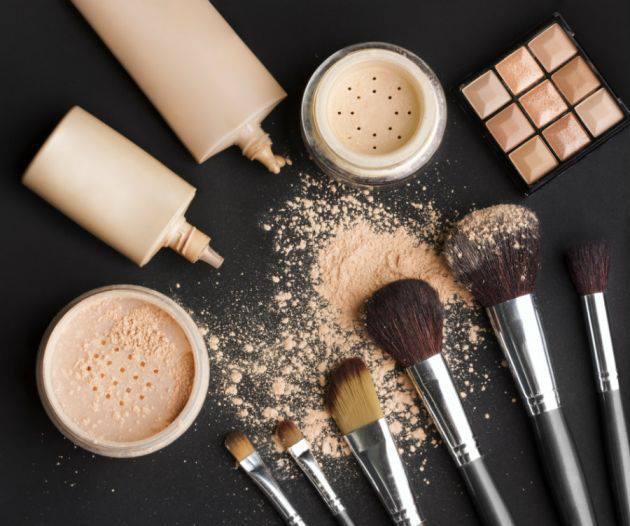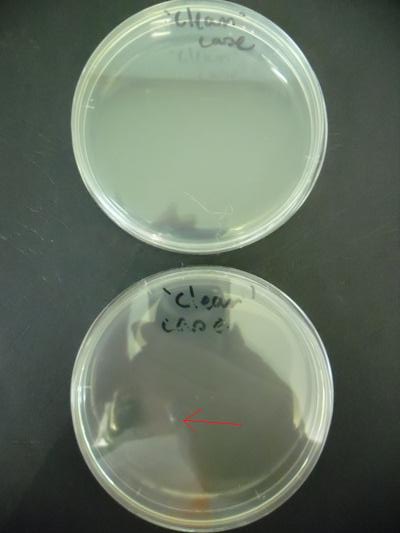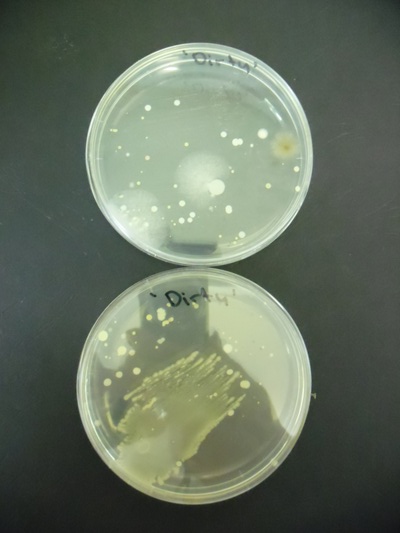 Getting professional beauty services done should be a fun, relaxing, and most of all SAFE experience. While makeup may seem like a fun profession, you should remember that makeup artists work very closely with sensitive mucous membranes such as your eyes and mouth. If a complete stranger at the mall came up to you and asked to borrow your lipstick, would you hand it to them? EW, NO! Of course not! You know there are germs that can be passed through that makeup, so there are many steps your makeup artist should be taking to ensure that you do not contract any disease! These are also things you should keep in mind for your next trip to the beauty counter (testers? anyone can touch those!), so pay attention! If you are working with a new beauty professional, (or if you even if you have a regular makeup artist but never really paid attention!) here are some VERY IMPORTANT things you should be watching out for! Disclaimer: This article contains images and descriptions of some of the gross things that can be found in contaminated makeup, and could be considered 'graphic' to some people.
Getting professional beauty services done should be a fun, relaxing, and most of all SAFE experience. While makeup may seem like a fun profession, you should remember that makeup artists work very closely with sensitive mucous membranes such as your eyes and mouth. If a complete stranger at the mall came up to you and asked to borrow your lipstick, would you hand it to them? EW, NO! Of course not! You know there are germs that can be passed through that makeup, so there are many steps your makeup artist should be taking to ensure that you do not contract any disease! These are also things you should keep in mind for your next trip to the beauty counter (testers? anyone can touch those!), so pay attention! If you are working with a new beauty professional, (or if you even if you have a regular makeup artist but never really paid attention!) here are some VERY IMPORTANT things you should be watching out for! Disclaimer: This article contains images and descriptions of some of the gross things that can be found in contaminated makeup, and could be considered 'graphic' to some people.
#1
The #1 thing I see when I go to fashion shows that always grosses me out is seeing 'makeup artists' applying the SAME mascara to multiple people - using the SAME applicator that came with the mascara!
I put makeup artists in quotations, because NO makeup artist EVER should do this. Even though I see this from a lot of newer artists, I also have seen people who claim to have been doing makeup for ten years or more do this as well. See, here's the thing. Most people have these things called eyelash mites. It has nothing to do with cleanliness, because they live off of dead skin and the natural oil in your skin. It's perfectly fine that you probably have your own, although according to WiseGeek, "high numbers of eyelash mites can cause irritation and inflammation of a person’s skin. When this happens, a person is said to have a skin condition called demodicosis. Severe infestations of these mites may also lead to infections of the eyes or skin."

Kind of cute, no (ok, eek!)? These little guys are a large part of the reason you are supposed to throw out your personal mascara every 2-3 months (but not the ONLY reason). But, imagine someone using the same mascara wand, from the same tube on 20 different people, then using it on you. The same applies for liquid liner, or ANY cream or liquid based product period! Make sure your makeup artist uses a FRESH BRUSH OR WAND FOR EACH DIP INTO THE PRODUCT. If they double dip because they needed more product, they have still contaminated it, and the entire product is now compromised.
#2
The other big thing I see happen a lot is improper sanitary measures when dealing with lip products. This one is a bit more straightforward, and many of us already know not to share lip gloss, but don't take it for granted that your beauty professional is taking appropriate measures to keep you safe (has anyone ever seen Tabatha's Salon Takeover?). Although I rarely see anyone picking up a tube of lipstick and heading straight for someone's lips, I do see what amounts to basically they same thing - double dipping the lip brush into the lipstick palette or onto the lipstick itself. However, as I mentioned before, any liquid and cream based products can become a breeding ground for bacteria! One of the most common things that can be transmitted through makeup besides pink eye is the herpes simplex virus, and that is what could easily be found in contaminated lipsticks or lip palettes.
#3
Again, this is one that I see a bit less commonly, but still far too often for my opinion dirty makeup brushes. If you wear makeup on a daily basis, you should be washing your brushes at least once a week or so. A professional makeup artist should wash, or at the very least disinfect them between each and every client. Makeup brush hairs and sponges are porous, which means that they can attract and hold dirt, oil, and dead skin cells, as well as bacteria. Having worked at a beauty counter for almost a year, I can also personally testify that the brushes there were only shampooed once per week, although all employees were supposed to use the provided spray-on brush cleaner and alcohol between customers. I always brought my own brushes from my kit, and shampooed them every night when I went home! One of my favourite 'studies' in the case against dirty brushes is an experiment conducted by Lizzi at Makeup Utopia where she takes clean brushes, a dirty brush, (and of course a control blank), swipes them across a petri dish, and sticks them in an incubator. The bacteria that grew from being exposed to the dirty brush was straight up gross.


With contaminated makeup, you could develop conjunctivitis (pink eye), dermatitis, blepharitis, staph, impetigo, and ringworm, as well as the aforementioned herpes simplex virus. Keep this in mind when you are at a makeup counter, or are getting your makeup done by someone who you have not yet actively observed using proper sanitation procedures. Dry products like eye shadow and blush can easily be sanitized by wiping the top layer away, and/or spraying with alcohol or makeup sanitizing spray. However, these measures do not work for liquid or cream based products as you run the risk of simply pushing the contaminates further into the product. Also, be aware that the reason you can get your makeup done at a counter for so cheap ($30-$50 on average) is because the store salespeople are using the testers that are available to the public, so proper sanitation there can not be guaranteed. An early red flag for a freelancer charging those same types of rates is also not likely able to invest in the proper tools needed to maintain a sanitary kit, as well as provide quality cosmetics for use on clients, unless they are hobbyists, in which case their lower rate is simply to help offset the costs associated with safe and sanitary makeup application. Unfortunately, this is often not the case, and a lower rate can be a sacrifice of the makeup kit cleanliness. The testers at the mall are free, and when it comes to the bacteria in this case, you get more than you paid for, but keep in mind, I have personally witnessed unsanitary practices from all ends of the experience and/or pricing spectrum!
Urging you to stay safe when it comes to glam time,
Ashlie Lauren
www.ALaurenArtistry.com
www.ALaurenBridal.com






